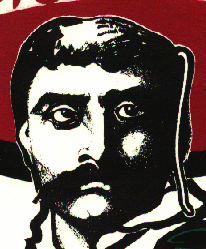

|
 Venezuelan notes
THE LIBERTARIAN IDEAL IN ECUADOR
THE LIBERTARIAN IDEAL IN PERU
ANARCHISM IN COLOMBIA
|
Cuba: 40 years laterA triumphant revolution that promised civil, political and social liberties, a just and honest government; an egalitarian distribution of the country's riches; which at the time enjoyed universal support and affection, turned very quickly into a kind of stalinist-tropical dictatorship that has kept itself in power for one of the longest periods in this century. After such a long period of abuse and exploitation, with a bankrupt country and their plans and agendas failed, the fatal desperation of the ruling classes, fearing a sad and bloody end, propose in Havana a different variety of political cynicism of the Cuban State. It is about making a pact with the enemy to the North, forced by the demand for capitalist currency that has become an imperative necessity in order for the Cuban economy to survive the "Special Period". The end of the "revolutionary" system will be, as we have said long ago, the return to the economic system existing in Cuba before 1959. The slow but sure return to consumerism, free enterprise, massive capitalist investments, the Opus Dei's influence, the return of the tourism system, prostitution, gambling etc. For starters, the most valuable currency in Cuba is that of the Empire.
Of course this turn in a direction opposite the true interests of the Cuban
people has the approval of both Europeans and Yankees who see in this economic,
though not political, change a gigantic opportunity to penetrate the Cuban
inversion market - just as the Spaniards and the Canadians do - counting
on a cheap labor force furnished and guaranteed by the Castro government
and the most humiliating exploitation of the Cuban working class in all
its history. The Cuban workers employed by the Spanish-Canadian investment
industry get paid in Cuban pesos while the businessmen pay the government,
of which they are of course partners, in dollars. The news from the
shores of the Potomac point in that direction and are in agreement with
Havana. The Empire has determined, slowly and at length, to make peace
with Castro in exchange for being allowed to make a third North American
investment in Cuba, softly and silently as behooves these modern times,
in exchange for supposed "reforms" on the part of the regime. For its part
the Vatican, in its sinister role of Deus ex machina in this maneuver,
offers the Castro regime its blessings and its services as mediating agents
by means of suggestions and/or agreements with the Empire looking to recover
church property nationalized at the beginning of the Cuban process. In
spite of Castor's slogans, which nobody pays attention to any more or which
must be interpreted in reverse, about the socio-economic continuity of
the "socialist" system - scientific marxism? - or better yet, the
interpretation the government gives its own deplorable policies, reality
and political pragmatism dictate that it adopt an oriental style fascist
approach in order to avoid the collapse of the regime that oppresses Cubans
and to continue the tyranny, this time at the service of the USA. But this
move should not worry the international left or Castro's sympathizers.
Worse maneuvers yet have been justified in the past 40 years and that of
"sleeping with the enemy" won't be any different.
Frank Hernández
Translation by Luis
|